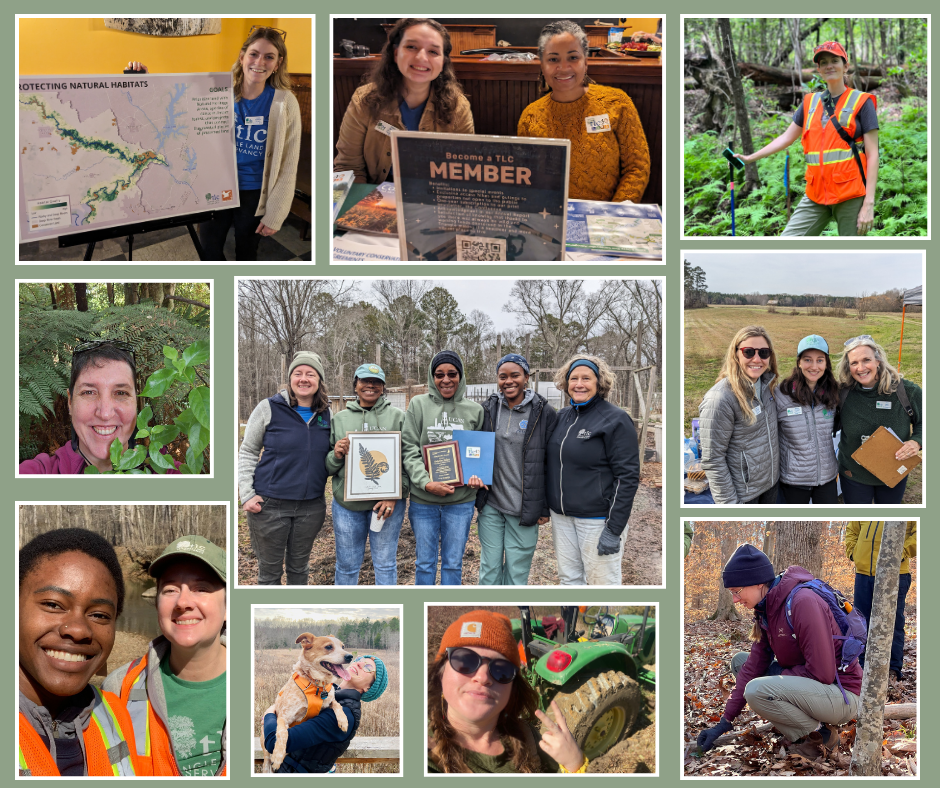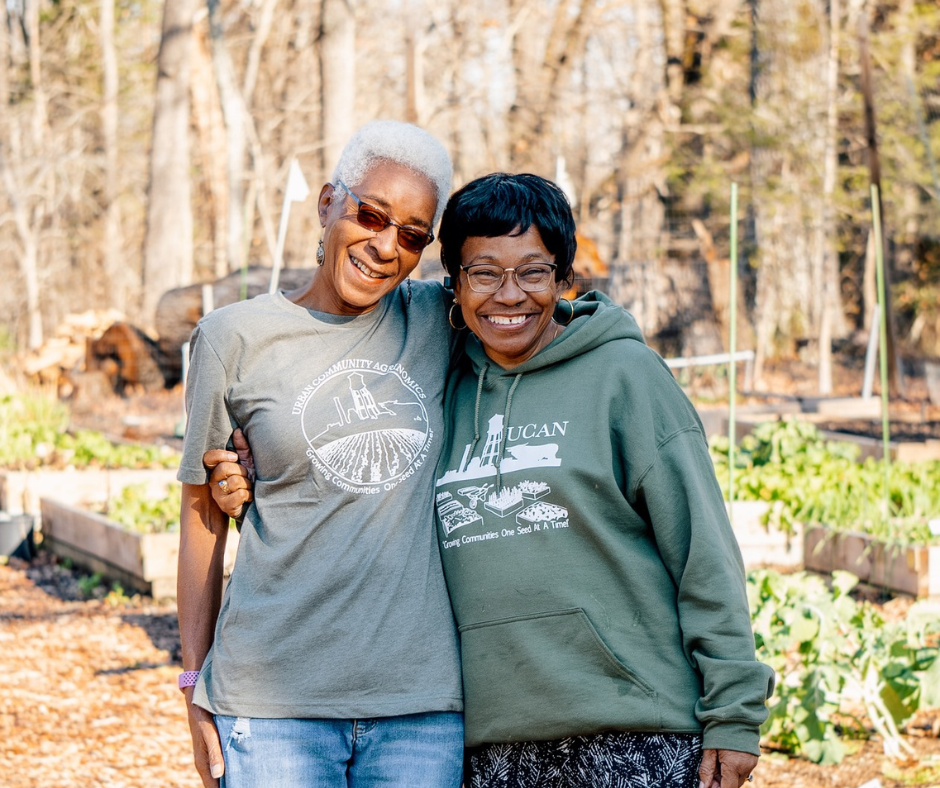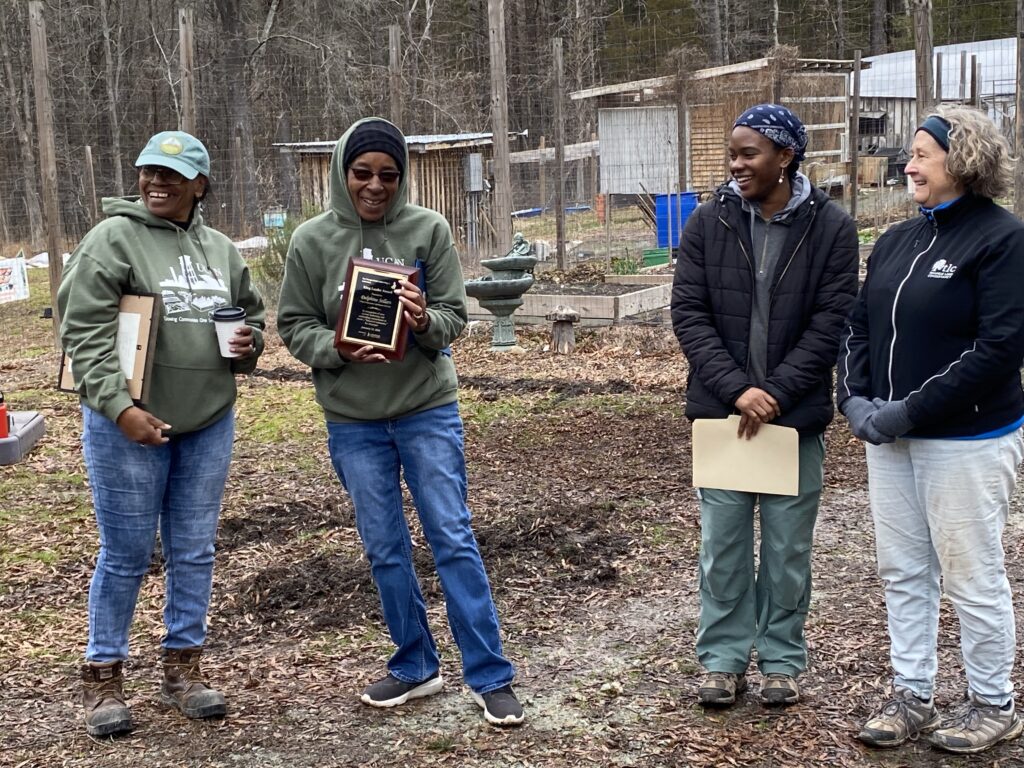
By Cara Lewis, Senior Communications Manager
According to the Land Trust Alliance, programs and events across the country are addressing an important, and traditionally omitted or dismissed demographic: women with an active role in land conservation. This includes landowners, farmers, ranchers, foresters, as well as land trust managers and other conservation professionals.
Triangle Land Conservancy employs a variety of women of all ages and backgrounds who are working every day to protect and preserve land throughout the Triangle. The TLC women’s team includes professionals in land protection and management, stewardship, philanthropy, farming, finance, conservation planning, and communications. Several TLC women were recently mentioned in ROOTED, a powerful history of the impact of land theft and the historic attacks on Indigenous and Black land ownership:
- Sandy Sweitzer, who has led the organization for the last decade and put TLC at the forefront of conservation organizations embracing racial equity as a responsibility to community conservation.
- Margaret Sands, who works closely with landowners on developing new community partnerships and land acquisitions.
- Kierra Hyman, who works on creating opportunities for people of color to help them gain access to land and promote their ancestral knowledge.
In her newly published book, author Brea Baker learned about these TLC women during her research and interview with Delphine Sellars, Executive Director at Urban Community AgriNomics in Durham, North Carolina.
Curious about what first brought TLC to land redistribution and conservation, Baker reached out to learn more. She was particularly struck by the relationship between Sellars and Sweitzer and the process involved in TLC giving rights to UCAN to develop community gardens on a managed land trust property.
A woman with a vision

In 2016, Delphine Sellars was working at the Durham County Cooperative Extension department and served on TLC’s Board of Directors. As she was preparing to roll off the board after six years of service, Sellars asked if TLC had property she could use to create community gardens in Northern Durham. Sweitzer thought of TLC’s Snow Hill IV property.
“I thought there would be a few raised beds,” said Sweitzer. “I had no idea UCAN would transform this land the way they have! I could not be more impressed.”
At the time, the parcel was overgrown and had several historic structures in disrepair and was clearly not suitable for farming and food production. Yet, Sellars and her sister Lucille Patterson had both the knowledge and the experience to plant and grow crops. The sisters grew up outside Washington, North Carolina, where they labored with their single mother to plant, tend, and harvest melons, sweet potatoes, and squash. When their mother bought a house, they later discovered their mother possessed only a chattel deed to the structure, but not the land on which it sat.
Working together to fulfill dreams and make a difference
While Sellars and her sister worked to build a community of volunteers who cleared the overgrown fields and hand-carried water in 5-gallon buckets to and from the farm, Sweitzer and Sands coordinated between TLC’s attorneys, Board of Directors, UCAN, and the grant sources that funded the original purchase of the land to devise a more equitable partnership. After several years of creative problem solving and relationship building, they were able to draft conservation agreements and closing documents that were aligned with the original funding from Raleigh’s Watershed Protection Program and the North Carolina Land and Water Fund and UCAN’s visions for the land that had grown in the decade since.
Dedicated staff at both of these women-led organizations persevered to turn an idea into a reality. On Martin Luther King Day in 2018, UCAN hosted a day of service and broke ground on Catawba Trail Farm.
“As the years went on, it became clear that the seeds UCAN was planting on this land were growing more than food or even community, and soon their vision and connection to this land had outgrown our original arrangement,” said Sweitzer. “Together we decided that maintaining a landlord-tenant relationship between our organizations – even with no money changing hands – would only further perpetuate a racist cycle without advancing either of our organization’s missions.”

Six years later on Martin Luther King Day in 2024, TLC officially and UCAN officially signed the land ownership documents deeding 176 acres to UCAN. It is one of the region’s largest transfers of land trust property to an African-American-led nonprofit.
“Imagine waking up to find that your greatest dream has come true. That’s what ownership of the Catawba Trail Farm means to me and UCAN,” said Sellars. “TLC gave us what we initially asked for, access to property to help build resilience among the residents of Durham County, and now they have granted us our ultimate wish, land ownership. On this glorious day we give honor to our ancestors who labored without choice on this land and to the many volunteers and supporters for investing and believing in the vision and mission of this small minority organization. As my loving mother would say, To God Be The Glory!”
A model for the conservation movement
For 245 years, the Catawba Trail Farm property was known as Snow Hill Plantation and was owned by North Carolina’s largest slave-owning family. At one point, the Cameron family had almost 1,000 enslaved people working their land.
In recent years, citizens have successfully advocated to rename districts and buildings named after the Camerons. While this is important, these actions do not change the sobering fact that of all private U.S. agricultural land, White people account for 96 percent of the owners, 97 percent of the value, and 98 percent of the acres. (Source: Rural America report on land ownership by race/ethnicity).
To address these gross inequities, Triangle Land Conservancy created the Good Ground Initiative (GGI) to conserve more farmland and increase landownership opportunities for historically underserved land seekers — including the many women who care for the land and the people in their communities.

